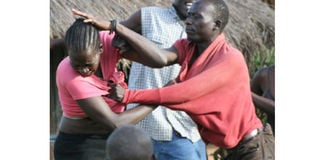West Nile records 5,000 gender violence cases

A couple engages in a fight. Gender-based violence cases are reported to be on the rise in West Nile. FILE PHOTO
WEST NILE- Cases of gender-based violence (GBV) meted out against women and children are on the rise in West Nile.
Speaking to Daily Monitor on Tuesday, the West Nile regional police public relations officer, Ms Josephine Angucia, said the increasing cases are mainly in rural areas.
“In some cases, children get trafficked or taken off to other places for safety when there is constant violence at their homes. We have been receiving a lot of cases on defilement, child neglect, child trafficking, abduction, rape and incest,” she said adding that police plans to work with NGOs to avert the vices.
According to police statistics, since 2014, the police in West Nile recorded 5, 372 cases of GBV. These cases were documented from Arua, Nebbi, Koboko, Zombo, Maracha and Pakwach districts.
But Ms Angucia said GBV cases are still high. In 2016 and 2017, she said police recorded 1,417 and 1521, cases respectively.
Out of the six districts sampled in 2017, Arua topped the districts in West Nile with 611 cases followed by Koboko with 310 cases and Zombo with 247 cases.
Others are Nebbi with 132 cases, Pakwach with 119 cases and Maracha district with 102 cases.
Causes
She said alcohol consumption, unfriendly cultural norms, lack of trust among couples, land wrangles and widow inheritance have continued to fuel violence in homes in the sub-region.
One of the survivors of GBV, Ms Felista Okusaru, a resident of Okalimbe Village in Pajulu Sub-county, said: “When I got married, we were happy.
After one year, my husband started drinking alcohol almost every day, resulting into quarrels. I sustained injuries on my body because he could beat me. Even two of our children left and are now staying with their uncles. Sometimes, I and the children could sleep in the bush to avoid fighting.”
By-law
As a result of increasing cases, Arua District has drafted an ordinance, the Alcohol Control Bill 2016, which seeks to regulate time for drinking, punish perpetrators of GBV, bar transportation and illegal sale of sachet waragi among others.
According to the chairperson GBV Network in the district, Mr Geoffrey Dramani, some of the violence cases have led to child marriages.
“Some children lose hope and they disappear from home and opt to get married. Yet these are children who are not ready for marriage and they end up breaking and fighting most times.”




